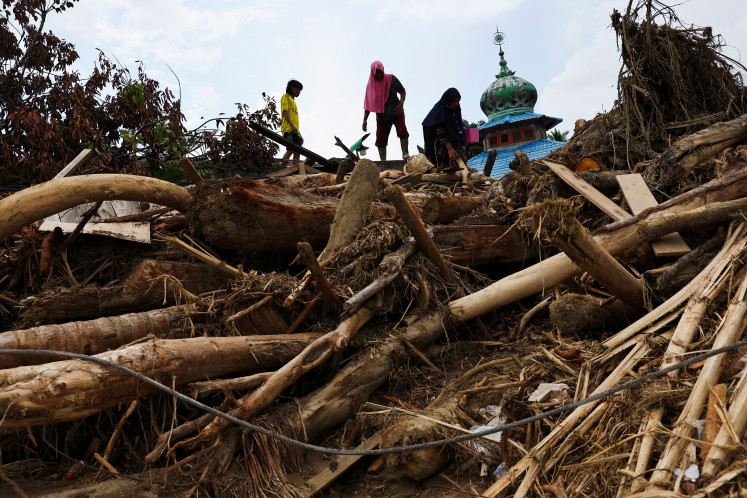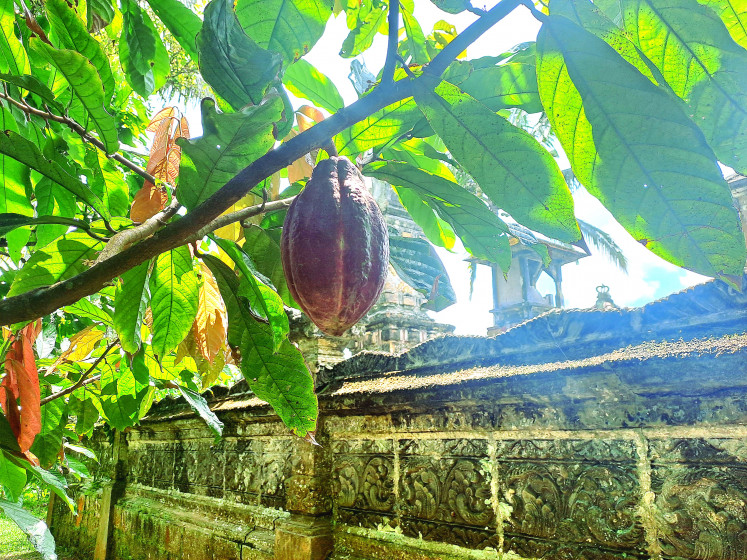Popular Reads
Top Results
Can't find what you're looking for?
View all search resultsPopular Reads
Top Results
Can't find what you're looking for?
View all search resultsRSPO wants members to stop planting on peatland
Following its commitment to reduce greenhouse gas (GHG) emissions, the Roundtable on Sustainable Palm Oil (RSPO) has added a new criterion, which will require companies to stop establishing new oil palm plantations on peatland in order to obtain certification
Change text size
Gift Premium Articles
to Anyone
F
ollowing its commitment to reduce greenhouse gas (GHG) emissions, the Roundtable on Sustainable Palm Oil (RSPO) has added a new criterion, which will require companies to stop establishing new oil palm plantations on peatland in order to obtain certification.
RSPO Indonesia director Desi Kusumadewi said the extraordinary general assembly held by the international certification and multi-stakeholder organization in late April in Kuala Lumpur had agreed on a revision of its principles and criteria (P&C) that encapsulated additional standards, including on carbon emissions, peatland, pesticides, forced labor, human rights and anticorruption.
Desi said that among the imminent additional standards for producers to obtain the organization's certification was to stop planting on peatland, which despite being deemed as prospective for palm oil cultivation, had long been blamed by environmentalists as contributing greatly to deforestation and increased GHG emissions.
For those companies that already had plantations on peatland, Desi said the RSPO had set up a mechanism called the GHG calculator to gauge the amount of carbon emissions generated by a particular plantation, to help companies design a way to 'repay their carbon debt'.
She said the new criterion was to assert the organization's 2007 P&C that, despite having prohibited certified members from opening palm plantations in conservation areas, had yet to explicitly mention peatland in any of its articles.
The P&C, according to Desi, would be evaluated every five years to ensure their relevance to current sustainability practices.
'We know it won't be easy. We won't directly apply the new criterion and we will give around a year for preparation and for a national interpretation, considering each country has its own laws and views on such an issue,' Desi said.
As a voluntary body, Desi said the RSPO's P&C stated that companies had to also abide by national laws and requirements, so that RSPO certification would be in accordance to existing national regulations.
Indonesia ' which is the largest RSPO ' certified palm oil producer, contributing 48.2 percent out of a total annual 8.2 million metric tons of sustainable palm oil ' allows peat planting as stipulated in a 2009 Agriculture Ministry regulation on the utilization of peatland for oil palm cultivation.
According to Greenpeace data, no less than 10 million of Indonesia's 22.5 million hectares of peatland have already been deforested and drained. The country currently has around 9 million hectares of palm plantations.
The government, however, issued a two-year moratorium in 2010 to halt the commercial use of a total 65.2 million hectares of primary forests and peatland in an attempt to curtail deforestation and reduce greenhouse gases.
The Forestry Ministry also recently announced that the country would likely extend the moratorium, which is due to expire on May 20.
Among the strong contenders for the RSPO's new criterion will likely be the Indonesian Palm Oil Producers Association (Gapki). Besides having officially withdrawn from the Kuala Lumpur-based organization last year to focus on the government's mandatory sustainable oil certification (ISPO), Gapki has pledged to not prohibit its members from joining the international certification scheme.
Gapki has long voiced its approval of the forest moratorium and expressed support for the development of peatland for oil palm plantations, saying that peat planting is better for suppressing carbon emissions than leaving it dormant.
Indonesia is currently ranked third among countries with the most members in the organization with 13 percent, after Germany with 18 percent and the UK with 16 percent.
The RSPO has 1,217 members comprising producers, processors and traders, consumer goods manufacturers, retailers, banks and investors, as well as environmental and social NGOs from up to 53 countries, which produce around 40 percent of the world's palm oil and are processors or users of more than 30 percent.










